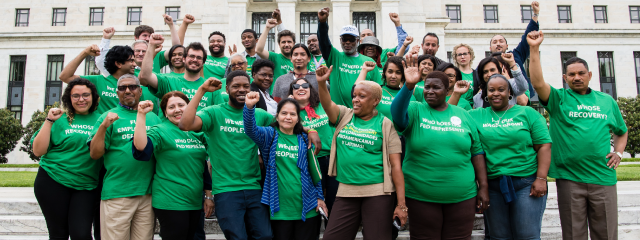Blog
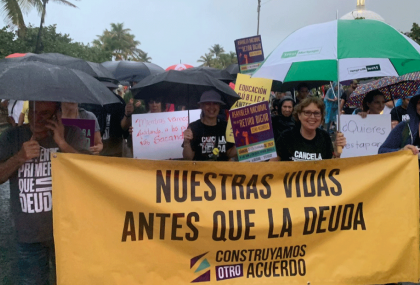
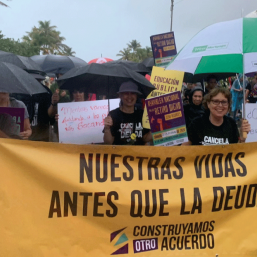
Since late December, a series of major earthquakes shook the southwest area of the archipelago of Puerto Rico causing an island-wide blackout, leaving thousands homeless, and causing structural damage to hundreds of buildings, schools, and roads. To this day, in the towns of Guanica, Peñuelas, Guayanilla, Arroyo, Yauco, Guayama, Ponce and others, an estimated four thousand people are housed in shelters, and thousands more have pitched tents in their backyards.
In the aftermath, CPD quickly mobilized with the Maria Fund, to move rapid response funding to an initial 6 community groups. On the Island, CPD affiliate Taller Salud is helping to channel much needed resources in the south. You can support these efforts by donating here.
Organizers knew that even more action was needed to make sure Puerto Rico received every resource it could to rebuild. On January 8, CPD affiliates and allies mobilized in Washington DC, Philadelphia, and New York City to demand the federal government release recovery funds. CPD affiliates involved include CASA, CUFFH and Make the Road PA who mobilized members to take action in their communities. CPD also released an OP-ed demanding that $8.7 billion destined to debt payments be released and used for the reconstruction of the island.
A week later, CPD project Contruyamos Otro Acuerdo, raised demands to protect pensions for retirees. To support the diaspora, CPD hosted a digital Cacerolazo – a form of popular protest which consists of a group of people making noise by banging pots, pans, and other utensils in order to call for attention – that was joined by affiliates and national partners in solidarity with the actions happening on the island. In moments like these, it is the people and our networks of solidarity that take action and make a difference.
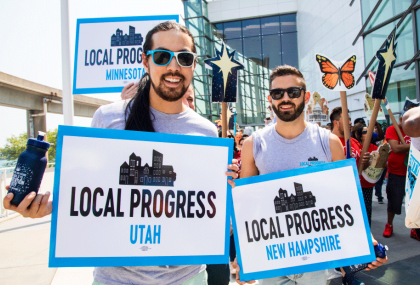
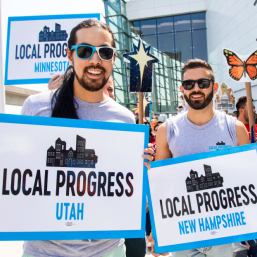
In 2018, Local Progress launched Reform/Transform: A Policing Policy Toolkit, a resource designed to help elected officials, policymakers, and organizers evaluate the strength of policing policies, based on a set of standardized criteria and best practices. In December 2019, Local Progress worked with its members to follow up with an analysis of policing policies in 12 cities on four of the toolkit’s policy areas: ICE collaboration, use of force, independent oversight, and police spending versus other priorities.
The findings showed that, across the four policy areas, all 12 cities can and must do more to strengthen police accountability. However, this work is also very dynamic –– even as we publish these results, policy changes and budget negotiations are underway across the country. Several cities have won policy victories in recent months. For example, Washington, DC recently restricted its already-limited cooperation with ICE “detainer requests.” Durham and Minneapolis have allocated money slated for policing into urgent community needs like higher wages and violence prevention.
While police reform does not fully tackle the structural challenges of over-policing, hyper-criminalization, or mass incarceration, the toolkit offers practical, actionable resources, designed specifically to support local elected officials in their ongoing efforts to enact progressive policing policy reform. Local elected officials hold a unique power and responsibility to advocate for that transformation while driving meaningful reform to reduce harm, protect civil liberties, and ensure existing systems face stringent oversight and accountability. The toolkit aims to contribute some immediate policy reforms, while we continue to engage in the larger grassroots movement to dismantle the current criminal legal system and redefine conceptions of public safety. Check out and share the toolkit here!


In December 2019, CPD and the Economic Policy Institute, published a report "Still Terrible at Two: The Trump Tax Act Delivered Big Benefits to the Rich and Corporations But Nearly None for Working Families." On the two year anniversary of Trump's tax act, the report uses government data to show there has been no increase in wages for working people and no increase in business investment--all while corporate revenues have plummeted and corporate stock buybacks have soared. Overall, the paper finds that the TCJA - one of the largest overhauls of the tax system in the last 50 years - enacted sweeping changes to benefit corporations and wealthy individuals while the interests and priorities of working families were ignored.
The TCJA has failed to boost American workers’ wages or to deliver broad prosperity for low-income communities or communities of color. The report features powerful stories from member leaders at United for Respect who have faced stagnant wages while working at companies that have spent billions in corporate stock buybacks, rather than investing in their workforce. In addition, the report profiles small business owners and members of the Main Street Alliance who found Trump's so-called "small business tax cuts" remained elusive. The report was released in tandem with a week of action coordinated by the Tax March. Download and read the full report here.
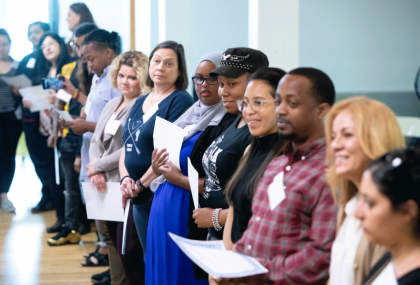
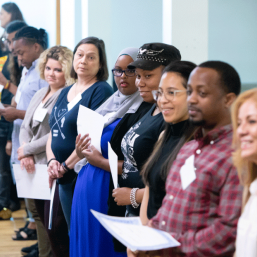
Earlier this month, Executive Directors and key staff from more than 30 CPD affiliates met in Stony Point, New York to plan for 2020 and beyond. They spent two and a half days connecting and aligning a network-wide strategy, and the agenda was packed: they discussed racial capitalism, made plans for shared transformational legislative goals, how to foster unity and trust across the CPD Network, how to actualize our strategic vision as we head into another challenging year. Collectively, our network is working to build a base of one million people, and it was exciting to dig in on the path to success as a group.
Further, we were able to do important collaborative planning, learn from each other, share ideas and resources, and identify key next steps for the network as a whole to continue working towards building a stronger, more just world.
The problems our communities face are vast and systemic. But, we are facing them as a unified, powerful, national network, and together we have what it takes to build the world we want. There is much work to be done, and we are ready to do it!
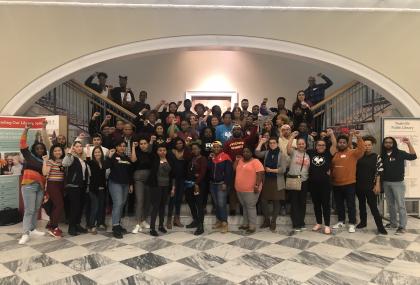
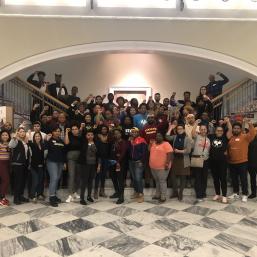
CPD’s Justice Transformation team kicked off the new year with a weekend of movement and power building. The group wrapped their second Freedom Lab this past weekend, in Nashville alongside Law for Black Lives and PolicyLink.
Building off the inaugural convening last year in Milwaukee, it was a powerful event with nearly 70 people in the room - representing organizers and activists from all across Tennessee, as well as North Carolina, South Carolina, Georgia, and some other folks across the country. The group also included a strong delegation from CPD affiliate New Georgia Project.
The cohort spent two days strategizing on divest/invest decriminalization campaigns, including deep dives into budget analysis, advocacy tactics, participatory budgeting and communications strategies.
The Freedom Lab took place in the Nashville Public Library, a stunning municipal space with an incredible support staff and a profound historic significance for civil rights movement activism (including Woolworth's sit-ins).
The group looks forward to hosting another Freedom Lab later this year, as well as creating additional tools and resources that will further support movement partners in the divest/invest space.


CPD’s signature NYC fundraiser, The Guiding Light Awards, is just around the corner on Tuesday, December 3! Over 300 philanthropists, frontline organizers, strategic partners and allies will gather at BRIC House from 6:30–9:30pm to honor amazing individuals, campaigns, and organizations for their role in supporting the movement. Please join us as we lift up courageous leaders of our community––progressive pioneers and disruptors, champions for racial equity, economic and gender justice, and protectors of a participatory and popular democracy.
We are proud to be honoring an amazing group of leaders:
Teresa C. Younger is the President and CEO of the Ms. Foundation for Women, the first (and oldest) women’s foundation. Younger is a renowned thought leader, strategist, advocate, activist and amplifier who has spent over 20 years on the frontlines of some of the most critical battles affecting the lives of women and their communities. Read more about Younger here.
Nan Goldin is an American photographer who gained critical acclaim for her deeply personal and candid portraiture documenting herself and those closest to her, especially in the LGBTQ community, and the heroin-addicted subculture before founding the advocacy organization P.A.I.N. (Prescription Addiction Intervention Now) in response to the opioid crisis. Read more about Goldin here.
La June Montgomery Tabron is the President and CEO of the W.K. Kellogg Foundation. As a champion for vulnerable children and for creating the conditions necessary for them to thrive, Tabron leads the Kellogg Foundation and its work to ensure the optimal development of young children, heal the profound racial inequities in communities and cultivate community leaders and community-led solutions that support educated kids, healthy kids and economically secure families. Read more about Tabron here.
The Campaign for New York Health is a statewide coalition dedicated to passing and implementing legislation for universal healthcare in New York State. They represent over 150 community and labor organizations made up of nurses, teachers, patients, doctors, union members, business leaders, faith and immigrant rights community, progressive political organizations, healthcare advocates and providers. Healthcare is a human right that should be accessible to all of us, not just those who can afford to pay. Read more about the campaign here.
We hope you’ll join us to support our network—53 affiliates across 131 cities in 34 states, Puerto Rico, and the District of Columbia—to empower and activate the communities most impacted by injustice and inequity.
Please contact Beth Slade at bslade@populardemocracy.org for ticket information or to become a host or sponsor the event.
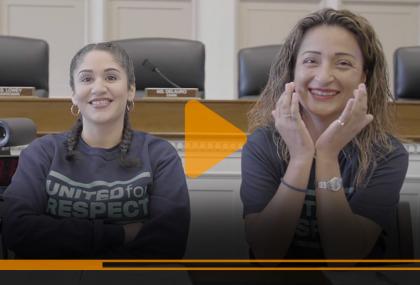
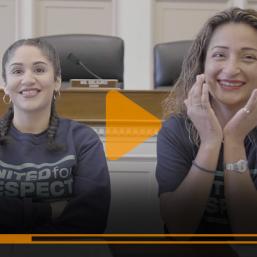
Last month, hourly service workers from CPD affiliates United for Respect and One Pennsylvania called on Congress to guarantee a fair workweek and combat the last-minute scheduling practices that make it impossible for workers to thrive. At the same time, CPD amplified new data illustrating how erratic and unpredictable workweeks hurt families and perpetuate racial inequality. These events made headlines in The New York Times, Vox, CNN, Fortune, Maine Beacon, and other outlets. And just yesterday, Senator Elizabeth Warren reintroduced the legislation to help ensure that low-wage employees have more certainty about their work schedules and income. Check out and share powerful stories from workers here.
A few key highlights from our Fair Workweek actions last week include:
-
United for Respect leaders Brandy Powell and Jenny Allen participated in a Capitol Hill roundtable discussion with researchers, policy advocates, and Representative Rosa DeLauro (D-CT). During the conversation––which was hosted by CPD, United for Respect, the Washington Center for Equitable Growth, and the National Women’s Law Center––Brandy and Jenny shared how last-minute schedules make it hard to make ends meet and harms their children. Check out other powerful stories from workers here.
-
Following Jenny and Brandy’s testimony, on November 5, Rep. DeLauro and Senator Elizabeth Warren reintroduced a stronger Schedules that Work Act. The legislation will rebalance our lopsided workweeks by requiring companies to provide two weeks’ advance notice of work hours; compensate workers when their hours change at the last minute; guarantee adequate time between shifts to commute, eat, and rest; and give workers a voice in their schedules.
-
New national data illustrating the severe impact of schedule instability on workers of color and working families. In a survey of 30,000 retail and food service workers at 120 of the largest U.S. retail and food service companies, California researchers Daniel Schneider and Kristen Harknett found that an unpredictable work schedule raises the likelihood that workers will experience material hardship, including food and housing insecurity. Erratic work schedules also heighten children’s anxiety and behavioral challenges and perpetuate racial inequality, as workers of color, particularly women of color, experience more unstable work hours than their white coworkers at the same employer.
-
States and cities continued to take action to enact Fair Workweek legislation. On October 16, New Jersey Senate Majority Leader Loretta Weinberg announced her intention to introduce fair workweek legislation at a press conference with Make the Road New Jersey, United for Respect, Unite Here, SEIU, NJ Citizen Action, and other allies. On October 25, Rep. Rosa DeLauro, State Sen. Julie Kushner, and State Rep. Robyn Porter joined the Connecticut Working Families Party, activists, and scholars for a roundtable discussion about how unfair on-call scheduling practices have affected workers’ lives.
Workers across the country are rising up in support of a Fair Workweek. Watch and share our video to help us spread the word about a Fair Workweek and ensure all workers across the country have these protections!
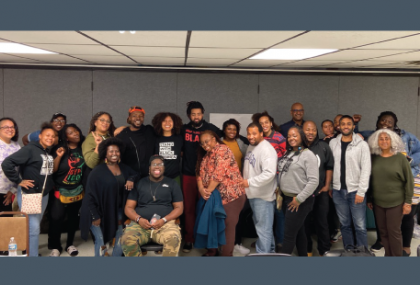
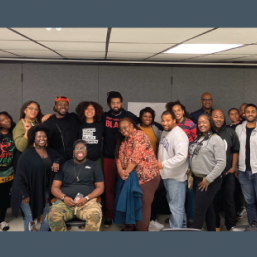
At the start of October, CPD’s Justice Transformation team held the first ever ‘Freedom Lab’ in Milwaukee, Wisconsin. In partnership with Law for Black Lives and Policy Link, the two day event brought together CPD affiliates and allies, including including BLOC, LIT and the Liberate MKE campaign––which is calling for a $20 million divestment from the police department and investment into community priorities.
Nearly 25 organizers from Chicago, Madison, Minneapolis, and Detroit joined us to discuss challenges, opportunities, and lessons from ongoing and anticipated campaigns to demand municipalities shift resources away from policing and prisons towards community investments in health and well-being.
Attendees discussed city budget analysis, and had a fishbowl conversation about campaign experiences––in which LIT staff masterfully presented their recent victory at the Milwaukee school board redirecting money from school-policing to trauma care. They did a deep dive into communications strategies, engaged with electoral politics/elected officials, and facilitated breakout sessions on lobbying, storytelling, participatory democracy, budgeting, and power mapping; a visual tool used by social advocates to identify the best individuals to target to promote social change.
Together they developed a range of budgetary, campaign, narrative, organizing resources and tools to share together, with the anticipation of creating a more robust toolkit for affiliates and allies to use in their localities. The CPD Network will continue it’s vital work to end discriminatory and oppressive policies that marginalize Black people and other communities of color and we cannot do this work alone. Please make a donation to support this important work today!
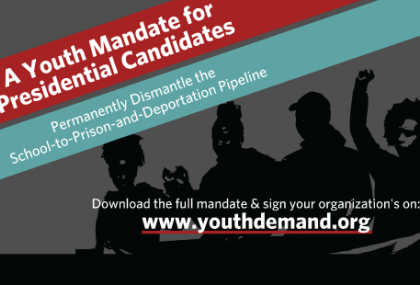
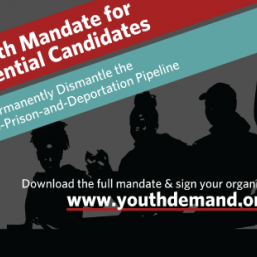
For more than three decades, Black and Latinx young people, parents, educators, and communities have organized to dismantle the school-to-prison-and-deportation pipeline. Ahead of the 2020 election, Black and Brown young people across the country are demanding that those running to be the next president listen and engage with them on critical education and racial justice issues. Youth leaders are seeking a firm commitment from candidates to permanently dismantle the school-to-prison-and-deportation pipeline by signing on to the Youth Mandate for Presidential Candidates: Permanently Dismantle the School-to-Prison-and-Deportation Pipeline (referred to as the Youth Mandate).
The eight-page political mandate, which was developed by the youth organizers and youth leaders at our sister organization CPD Action, and the Alliance for Educational Justice outlines transformative, anti-racist policies to guide the nation towards building supportive and inclusive learning environments for all students and families. It also seeks to redress the harm created by past policies. It has been endorsed by 130 youth-led organizations and allies across the country.
Among its key demands, the mandate calls for divesting from police and criminalizing infrastructures in schools, strengthening students’ civil rights, and ending the private takeover of the school system. It also builds on a growing grassroots movement calling for the repeal and replacement of the 1994 Crime Bill, which gave way to the largest source of direct federal dollars to put police in schools.
“When I go to school it’s not a welcoming place. There are security guards rushing us through metal detectors. It makes the day start off really badly. This is my education, I shouldn’t have to feel like this. I wish I could feel happy walking through the doors every day like students in the more white suburban districts probably feel,” said Saniya B., a 16-year-old youth leader with Leaders Igniting Transformation in Milwaukee, WI. “Young people coming together can really change things. I just turned sixteen this week and I am already making my voice heard. I need a President who will listen to young people like me and makes sure we end the school-to-prison-and-deportation pipeline now.”
The Youth Mandate represents a critical opportunity for candidates to engage young people from across the country who comprise a growing share of the electorate that feels unrepresented. Youth are looking for an acknowledgment from candidates that they understand how young people of color in the United States experience our systems and institutions differently because of our racial identity and because of the foundational racism of this country. This means that candidates need to proactively talk about race and institutional racism in all its forms.
“Youth of color are running a race for a better life, but the way schools treat us keeps us ten steps behind,” said Aryana Brown, Fellow at Florida Student Power Network. ”This Youth Mandate should be read by each candidate because it’s time for students of color to be heard. It presents the true facts about the school-to-prison-and-deportation pipeline. It asks those seeking office, ‘Will you stop the practice of criminalizing schools? And, what are you going to do to fix the broken education system?’”
The mandate lays the groundwork for centering youth voices in places that are already key political battlefields in the 2020 presidential race. The groups are slated to host candidates in upcoming roundtables and direct engagements on the school-to-prison-and-deportation pipeline over the next couple months. Read and share the full youth mandate here
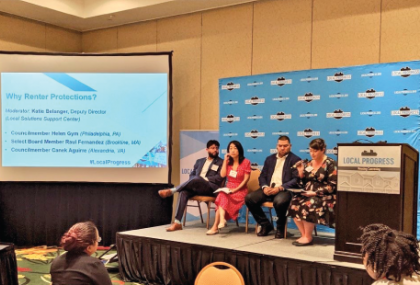
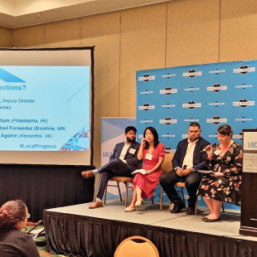
Local Progress (LP), a movement of local elected officials advancing a racial and economic justice agenda through all levels of local government, held its first convening on Housing Justice in Durham, North Carolina in October. Nearly 50 LP members from Spokane, WA, and Berkeley, CA, to Portland, ME, Austin, TX, and dozens of localities in between, came together for two days of transformative learning and community building with CPD staff and other local electeds across the country.
Our homes are the foundations for our lives. They are gathering spots, and places where we recharge, and connect with ourselves and our families. But too many people are forced to lay their foundation on shaky ground. Because of outrageous rent hikes, poorly-maintained and underfunded public housing, racial segregation of neighborhoods, increasing urban displacement, and corporate tax and land giveaways, more and more people in this country lack a home to thrive. CPD and our network of state-based affiliates are leading local, state, and federal campaigns to challenge the racist and corporate roots of our housing system, and build a model that works for us all. In the absence of federal leadership, it is local leaders who are at the forefront of ensuring that housing is a human right.
These elected officials took on challenging conversations about how often they find themselves in the crossfire of local fights on zoning and development, and how they work to navigate and address the tensions, pressures, and challenges directly experienced by residents. They discussed the need to produce new affordable housing and preserve existing homes, address a shortage of housing, and the growing need to confront exclusionary zoning. They also talked about the need to pair growth with much stronger, durable protections for existing tenants and homeowners to combat evictions and displacement.
On a broader level, LP members discussed how to can take advantage of the current political moment: a presidential contest in which candidates and members of Congress are beginning to talk about housing as a right.
Leaving Durham, their vision is straightforward and powerful. LP members want their communities to be at the forefront of redefining what it means to have an affordable, dignified home. At CPD, we believe housing is the bedrock of making communities safe and ensuring that all communities have e freedom to thrive. As elected officials, their role is to ensure that growth advances our values and happens with community at the center. Please make a donation to support the critical work today.



